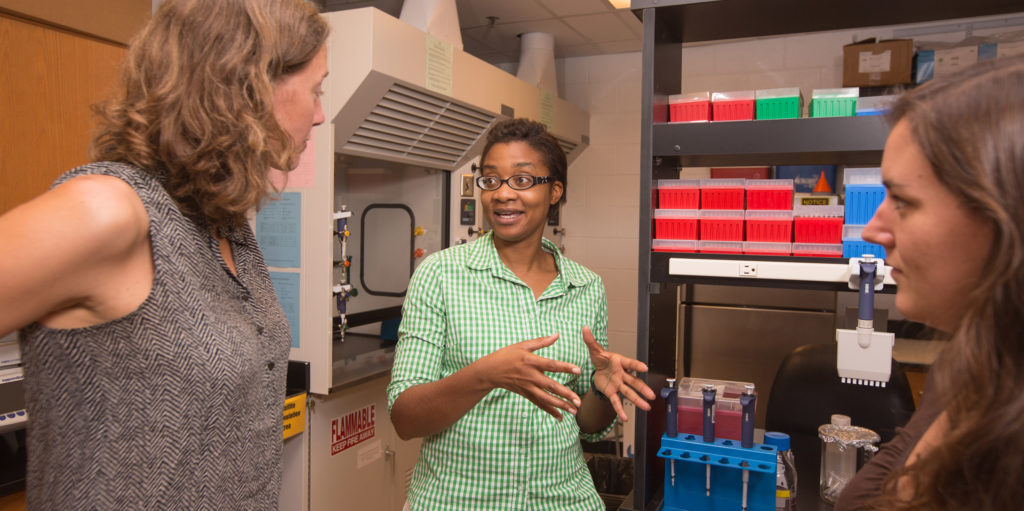Associate professor Vanessa Ezenwa, who has a joint appointment in the Odum School of Ecology and the College of Veterinary Medicine, says one of the highlights of her career is taking undergraduate and graduate students to Africa to conduct field research.
Where did you earn degrees and what are your current responsibilities at UGA?
I earned a bachelor’s degree in biology at Rice University in Houston and a Ph.D. in ecology and evolutionary biology at Princeton University in New Jersey. I have a joint appointment in the Odum School of Ecology and department of infectious diseases in the College of Veterinary Medicine. In addition to teaching undergraduate and graduate students, I run a research lab where my students and I study interactions between wild animal hosts and their parasites.
When did you come to UGA and what brought you here?
I came to UGA in fall 2010 from a faculty position at the University of Montana, Missoula. I was attracted to UGA because of the breadth and depth of research activities occurring in the area of infectious diseases on campus. UGA has so many world-renowned faculty working on infectious disease issues, so for me it’s an exciting place to be.
What are your favorite courses and why?
I teach an undergraduate course in behavioral ecology and graduate courses in disease ecology, which I really enjoy. But until recently, I had never taught a course for freshmen. In fall 2013, I taught a First-Year Odyssey seminar called “Infectious Films: Separating Fact from Fiction,” and I loved it! As a class we watched Hollywood blockbusters about infectious diseases (like “Contagion” and “I Am Legend”), and using these films as a jumping off point we discussed principles like how diseases spread, how they can be controlled and how drugs are developed to combat new diseases. The students were highly engaged in class activities, and I was surprised at how much they learned about infectious disease biology using such a non-traditional format. It was amazing to see the almost effortless way in which the students absorbed some really important concepts over the course of the semester. I can’t wait to teach this course again at some point in the future.
What interests you about your field?
I find parasites (from viruses and bacteria to parasitic worms) fascinating. Although we often cannot see them with the naked eye, parasites have profound effects on all aspects of the biology of their hosts. To study interactions between parasites and hosts, therefore, requires the integration of a number of disciplines, from physiology and immunology to ecology and evolutionary biology. What interests me most about my field of research is learning about theories and approaches from different disciplines and combining these to advance our understanding of how cryptic parasites influence everything from the behavior, physiology, ecology and evolution of their hosts.
What are some highlights of your career at UGA?
One of the day-to-day highlights of my career is taking undergraduate and graduate students to do field research in Africa. Observing the students’ responses to seeing an elephant or lion for the first time during routine field work reminds me how unique my job is. A more recent highlight of my career has been receiving a Fulbright Scholar award to pursue research on biodiversity and infectious diseases in France. I’m looking forward to starting that this fall.
How does your research or scholarship inspire your teaching, and vice versa?
My research and scholarship go hand-in-hand. I incorporate ideas that emerge from my research directly into my teaching, and the research process also very much inspires my teaching style—I think students can learn in the same way that scientists learn. The students I teach, both undergraduate and graduate, also very much inspire my research by bringing new perspectives to problems I’m thinking about.
What do you hope students gain from their classroom experience with you?
I hope students see that science is an iterative process. Nothing is static, and current concepts in the textbook are the product of the same types of activities they often carry out in the classroom or lab.
Describe your ideal student.
Curious, prepared and hard-working.
Favorite place to be/thing to do on campus is…
The Performing and Visual Arts Complex quad, a short walk from my office in the ecology building, is one of my favorite places to take a stroll in the middle of a busy day.
Beyond the UGA campus, I like to…
… explore hiking trails in North Georgia. I also enjoy traveling farther afield (which I get to do often as part of my job) and I always try to find a memorable hike to do wherever I am.
Community/civic involvement includes….
As part of a National Science Foundation CAREER award, I designed a short field course on infectious diseases for Kenyan undergraduate students based at my field research site in rural Kenya. The course brought students who grew up in the city to a rural area where people, wildlife and livestock all interact on a daily basis, introducing them to a whole new way of thinking about infectious diseases as a process that involves other species, not just humans.
Favorite book/movie (and why)?
I like reading all types of fiction, and I particularly enjoy books about long journeys. One of my favorite books about an epic journey is “Lonesome Dove” by Larry McMurtry.
Proudest moment at UGA?
My proudest moment at UGA so far was being able to hood my first Ph.D. student at the summer 2014 Commencement ceremony.
Originally published Oct. 5, 2014
